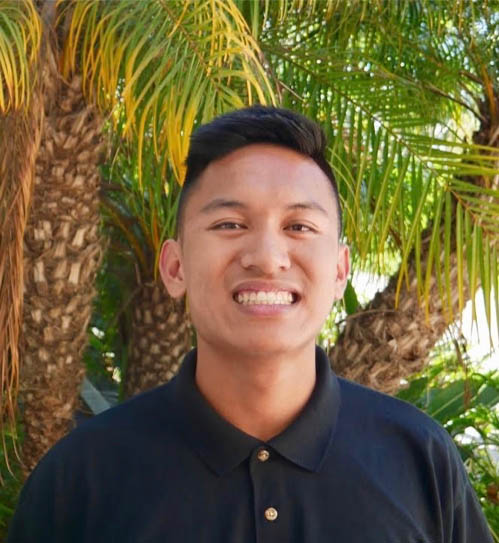Gener Abdon

Sustainability is so interconnected. Could you tell us how your major International Security and Conflict Resolution relates to sustainability?
International Security and Conflict Resolution (ISCOR) ties into sustainability through the fact that the climate crisis is impeding on national security and people's livelihoods around the world. I studied the climate crisis through the lens of conflict and conflict resolution. One of my courses looked at how the climate crisis will affect natural resource wars. Another topic I studied was climate justice, which has to do with how Global North countries are heavily contributing to the climate crisis while Global South countries are most vulnerable to the climate crisis but aren’t contributing to it as much. I also looked at transnational social movements and how people around the world have been a catalyst for change. For example, Greta Thunberg held strikes outside of the Swedish Parliament in 2018, sparking a worldwide movement of climate strikes. Other climate strike leaders and I were inspired by her and held 2 climate strikes during Fall 2019 and 2021 here at SDSU.
During your many years in the Associated Students Sustainability Commission, Green Love, what have been some of your favorite parts?
It has been a fun journey! I really enjoyed tabling every Thursday at the farmers’ market with Green Love’s outreach committee during Fall 2018. Providing input on the Associated Students' Climate Action Plan was an important and meaningful process that I got to take part in. One of my favorite memories is when Green Love went to Old Town for a bonding picnic. Another great memory was meeting with the Climate Action Committee to dissect the SDSU Climate Action Plan and submitting recommendations to higher administration at SDSU. The greatest of them all is interacting with most of the students who have been involved with Green Love inside and outside of general body meetings and events.
Tell us about your internship with the Office of Energy & Sustainability. What was your role and what were some of your accomplishments?
My role was the AASHE STARS intern. AASHE stands for the Association for the Advancement of Sustainability in Higher Education Sustainability Tracking Assessment & Rating System. It’s a program for universities around the world to track their sustainability performance. Just as LEED is a sustainability certification for buildings, AASHE STARS is for schools. The general categories are academics, engagement, operations, and planning administration. I am glad to have held this internship for the past three years and I’ve grown so much from it. In fall 2020, I got our STARS rating up to gold from silver by collecting campus-wide sustainability data with the help of many students, faculty, and staff. Things that improved our score were the amount of classes related to sustainability, student clubs related to sustainability, and diversity, equity, and inclusion initiatives.
Through this internship, I was heavily involved with the Senate Sustainability Committee (SSC). Tyler Rogers, the SSC chair, and I teamed up to draft sustainability policy and bring it to the Committee. In May 2020, the Senate adopted the Committee's Sustainability Policy and Resolution. In that policy it states that SDSU will reach full carbon neutrality by 2030. Another project I worked on was Strategic Plan. At first, I attended Strategic Plan planning meetings with higher administration who did not know what sustainability was to help include sustainability in the Strategic Plan. I then worked on implementation, specifically Strategic Plan activities #15-#17. These activities focus on more SDSU sustainability leadership, new Climate Action Plan with the full carbon neutrality by 2030 goal, and campus-wide sustainability principles. Through all of these projects, I have connected with students, faculty, and staff who are making a difference. I like amplifying the energy of positive environmental change, whether that’s at events, in meetings, or through conversation with other passionate people.
What are your goals post-graduation?
I like looking at life from different scopes: vision, mission, values, and goals. My vision post-grad is to liberate all the marginalized communities around the world from their oppression and help create a more equitable system. My mission to achieve this vision can vary. I can work in public policy or grassroots movements with a laser focus on taking down Global North neoliberalism that resembles colonialism. I could also travel and uplift marginalized communities' voices. My values are justice, equity, and honesty. My goals are to travel the world, live day by day, maybe earn another graduate degree, and be appreciative of the privilege that my parents bestowed upon me.
